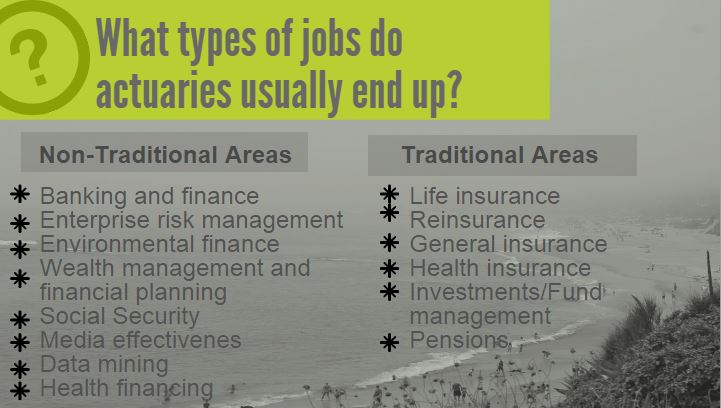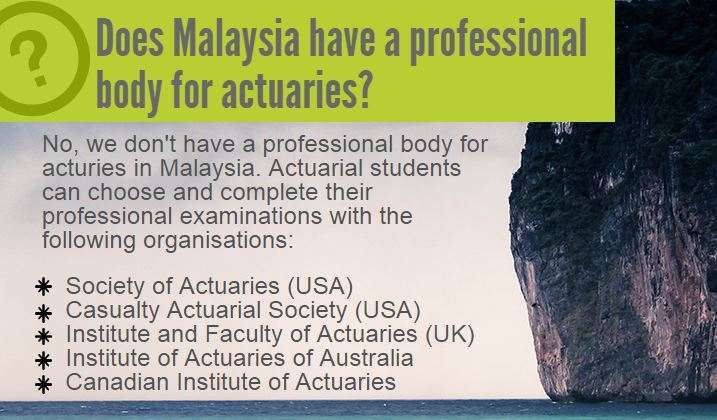7 questions to ask if you want to study Actuarial Science

Afterschool Team
January 19, 2015
Actuaries are business professionals who analyse the financial consequences of risk. These professionals use statistics, mathematics, and financial theory to determine future events. In Malaysia, most actuaries find jobs in insurance companies but that is likely to change as more and more industries need their expertise to assess risks, mine data, and other non-traditional responsibilities. Landing that first actuarial position may be one of the biggest challenges in your career, but through hard work and perseverance you will enter into a highly rewarding profession.
Aside from these skills mentioned, students who plan to take up actuarial science must have the desire to learn. To become an "Actuary", you must become an Associate, and ultimately a Fellow, of one of the professional societies by passing a series of examinations administered by them. The professional (associate and fellowship) exams are said to be extremely difficult so one must be truly be hard working and determined as entry into the profession is very competitive.
These days, actuaries work in many diverse areas. They can work in life and non-life insurance, advising pension funds, savings, capital projects, investments, healthcare and risk management. Such work offers management opportunities, with actuaries having a commercial as well as a technical role.
Another option for students who wish to study overseas would be American Degree Transfer Programme (ATP/ADTP). This four-year degree programme is offered by private institutions of higher learning. ATP/ADTP is designed to prepare the student for entry into American or Canadian universities. It is a popular and cost-efficient option for students who wish to study in reputable institutions of higher learning overseas.
If you are interested in becoming an actuary, you are required to earn an undergraduate degree in actuarial science (or other related courses such as mathematics, finance, statistics, etc.). There are many universities and colleges, here and abroad, that offer programs in actuarial science.
The SOA provides professional certification in life insurance, retirement systems, investment and finance and health benefits systems. The CAS is related to specialization in the property and casualty field. Generally, three of the first four exams in the SOA and CAS examination series are jointly administered by the two societies and, thus, include the same material. FoA, meanwhile, is the UK's only chartered professional body dedicated to educating, developing and regulating actuaries based both in the UK and internationally
The actuarial exams in the United States are designed to be hard in the sense that students will study for months to pass them. There are no exemptions for students taking FSA/FCAS (Fellow Society of Actuaries and Fellow of the Casualty Actuarial Society) examinations.
Passing the exams would mean earning these designations which will be viewed by the public. These designations covey a certain professional standing that the person has demonstrated a knowledge of the business environments within which financial decisions concerning pensions, life insurance, health insurance, and investments.
Actuarial students who plan to take the FIA/FIAA (Fellow of the Institute of Actuaries (UK)/ Fellow of the Institute of Australian Actuaries) examinations have it easer. In Australia,seven (7) universities currently offer accredited education programs that cover the Australia's Actuaries Institute's syllabus. Students may be granted a maximum of 8 exemptions based on university grades that are consistent with Institute standards.






